Articles by Ted Rosen, MD
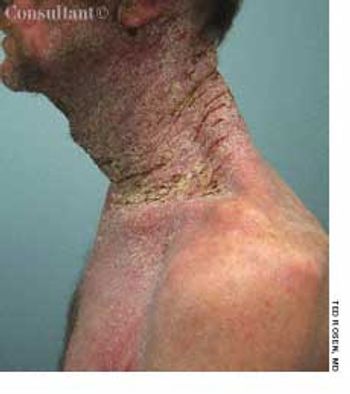
A52-year-old white man presented with a pruritic eruption on the neck of 3 months’ duration. The rash had not responded to a potent topical corticosteroid prescribed by another practitioner for the presumed diagnosis of eczema. The patient reported no current health problems. His history included a pubic louse infestation and several episodes of uncomplicated urethral gonorrhea. He readily admitted to having unprotected sexual intercourse with prostitutes.
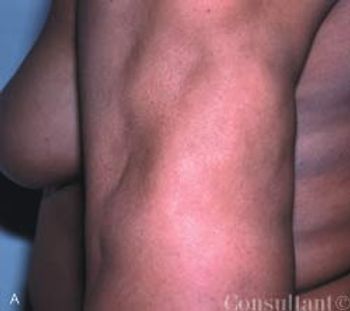
A 1-year history of “dents” on her body prompted a 40-year-old African American woman to seek medical evaluation. Her medical history was unremarkable; however, there was a strong family history of severe type 2 diabetes mellitus. The patient denied having received or having self-administered injections into the affected areas. She reported no history of deep, tender nodules at the sites.

Intense pruritus centered around a sparse “rash” sent a 32-year-old Chinese man for medical evaluation. The patient’s medical and social histories were unremarkable.
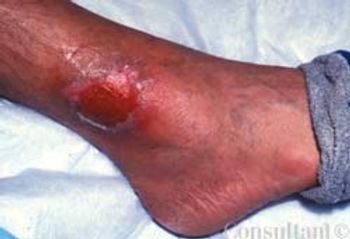
For 3 weeks, an extremely painful lesion had been present on the right ankle of a 46-year-old man. The 7 × 6-cm tender erosion was located just superior to the lateral malleolus. An antibiotic prescribed by another practitioner for a presumed infected insect bite had failed to ameliorate the pain and clear the lesion.

A 45-year-old woman presented with a slowly enlarging, mildly tender lesionon the left sole. The large indurated plaque was studded with multiple firmpapules and nodules that involved the instep and extended onto the medialaspect of the foot. There was no regional adenopathy.
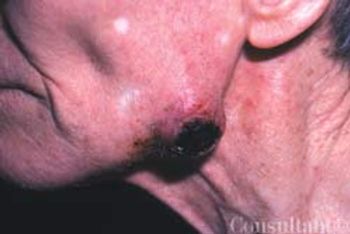
A painful, 4.8-cm nodule developed over 3 weeks on the face of a 76-year-old man. The results of a generous shave biopsy suggested a keratoacanthoma, a benign but locally destructive tumor that typically arises abruptly and enlarges rapidly. Curettage and desiccation were subsequently performed.
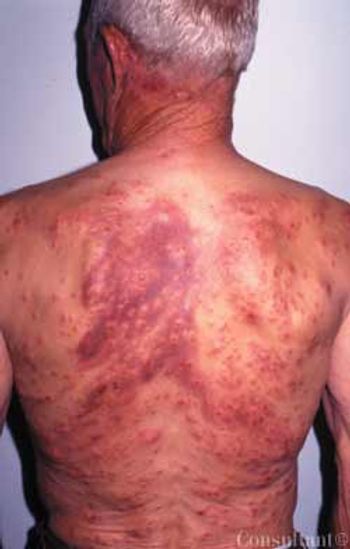
The abrupt onset of widespread cutaneous eruptions prompted a 66-year-old man to seek medical evaluation. The patient had had chronic myelogenous leukemia for 5 years.
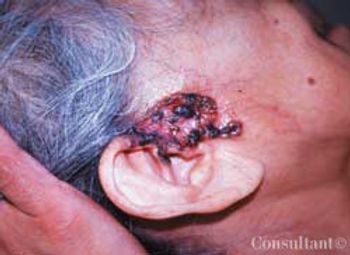
A 75-year-old Hispanic woman presented with a slowly growing, asymptomatic facial lesion of about 3 years’ duration.

A 28-year-old white man presented with a recent-onset rash that involved the upper arms.

A 25-year-old black man was intermittently plagued with a mildly pruritic eruption on his chest and back only.

A 37-year-old black man was referred for dermatologic consultation pertaining to a pending legal proceeding.

A 16-year-old high school wrestler developed an acute, pruritic eruption involving both arms and a small portion of the chest.

A recently married 24-year-old black man was brought (reluctantly) by his wife for consultation regarding the perpetual "dirt" on his back.

A 16-year-old black girl complained of a gradually worsening facial eruption. She had been assured by her family physician that this was caused by an allergy to soap; she applied over-the-counter 1% hydrocortisone cream daily.
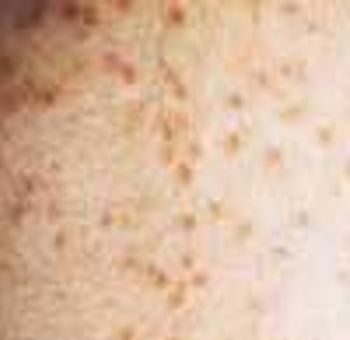
An intensely itchy dermatosis developed on the back of a 30-year-old Saudi Arabian renal transplant patient. The patient had never before experienced a similar eruption. He was taking prednisone and azathioprine to prevent transplant organ rejection, as well as amoxicillin for an upper respiratory tract infection.








